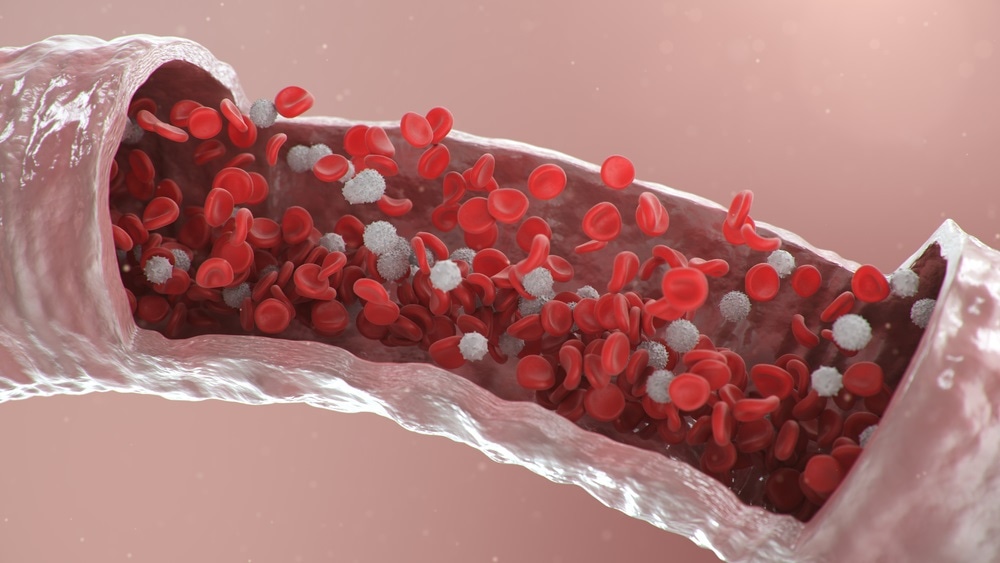A new study has found impaired blood vessel function in those living with human immunodeficiency virus (HIV). Researchers have shown that this impaired function puts those with HIV at an increased risk of cardiovascular disease.
 Image Credit: Rost9 / Shutterstock.com
Image Credit: Rost9 / Shutterstock.com
The paper, which has been published this month in Arteriosclerosis, Thrombosis and Vascular Biology (ATVB), a journal from the American Heart Association, highlights the link between impaired blood vessel function and increased risk of cardiovascular disease. It also brings to light the increased risk of cardiovascular disease in those living with HIV and also, kidney disease.
CVD leading cause of death among those living with HIV
Cardiovascular disease (CVD) accounts for the deaths of just under 18 million people each year, making it the world’s leading cause of death. Factors such as age, obesity, diabetes, blood pressure, and glucose and lipid levels have all been shown to increase a person’s chances of suffering from CVD. Now, a new study has revealed that HIV status may also influence a person’s risk of CVD.
Statistics place cardiovascular disease as the leading cause of death for those living with HIV. However, until now, scientists had not understood why this cohort is at an increased risk. The results of the current study reveal that even when HIV is well-controlled, there is a relationship between it and impaired blood vessels. It’s these impaired blood vessels that scientists believe increase a person living with HIV’s risk of CVD.
HIV associated with impaired blood vessel and kidney function
The study, led by James H. Stein, M.D., the Robert Turell Professor in Cardiovascular Research at the University of Wisconsin School of Medicine and Public Health in Madison, Wisconsin, investigated a total of 986 adults living with HIV and 1,547 participants who did not have the virus recruited in 9 separate studies. The researchers measured the brachial artery flow-mediated dilation of all participants, a measure that indicates endothelial function.
The study’s results revealed that those living with HIV had a reduced flow-mediated dilation by about 1% in comparison to those without HIV. These findings demonstrate that impaired blood vessel function in those with HIV. A reduction of just 1% in flow-mediated dilation is related to roughly 10% to 11% increased future cardiovascular disease in middle aged and older adults.
Interestingly, impaired blood vessel function was not found to be associated with disease severity and use of antiretroviral therapy.
Additionally, researchers found that those living with HIV had higher blood levels of creatinine, an indicator of diminished kidney function. This reduction in kidney function was more closely related to blood vessel function in those living with HIV than those without the infection.
Control of HIV does not mediate risk of CVD
The study’s authors were surprised to find that HIV severity or use of antiretroviral therapy had no effect on mediating blood vessel function.
The finding that HIV positive status was associated with impaired endothelial function suggests that HIV infection might increase cardiovascular disease risk beyond normal risk factors like cholesterol levels or high blood pressure.”
James H. Stein, M.D., the Robert Turell Professor in Cardiovascular Research at the University of Wisconsin School of Medicine and Public Health in Madison, Wisconsin
Additionally, the researchers were surprised to find such a strong link between kidney function and cardiovascular health, “we also did not expect such a large effect from kidney function on HIV patients' endothelial health”, “even mild kidney disease might play a role in HIV-associated cardiovascular disease risk” said Stein.
The study’s findings highlight the importance of monitoring cardiovascular health in those living with HIV. Stein stresses that just because the infection is controlled, it does not mean that a person is protected from CVD, and that it may be beneficial for those with HIV to take action to protect their kidneys and reduce their risk of CVD by taking steps to prevent diabetes or control their blood pressure.
Journal reference:
Stein, J.H. et al. (2021). Effects of HIV Infection on Arterial Endothelial Function. Arterioscler Thromb Vasc Biol. DOI: 10.1161/ATVBAHA.120.315435